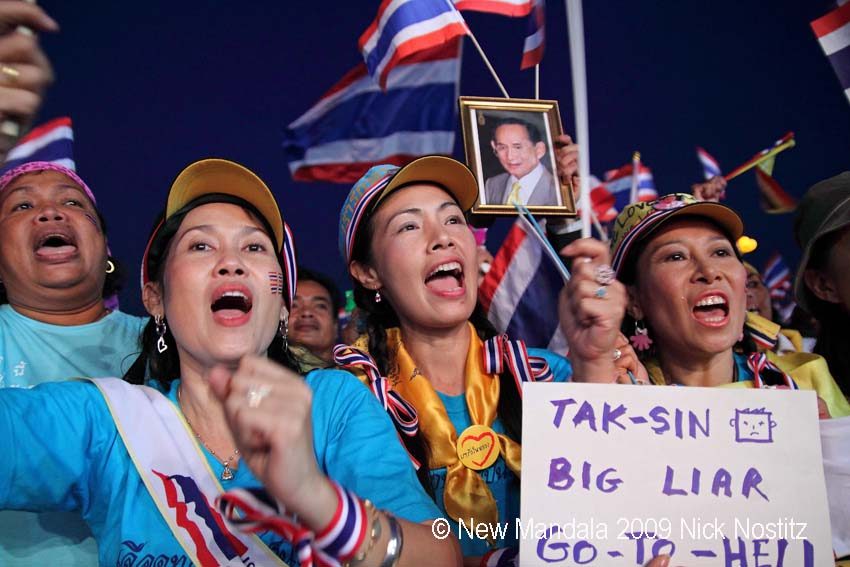The leadership of the current anti-government protest in Thailand, while still somewhat amorphous and fluid, is “old blood.” The key groups are composed of the former People’s Alliance for Democracy (PAD), the Democrat Party, and students. The success of the key leadership in turning out some of the biggest crowds in contemporary history is testament to their skilled mobilization and strong networks of supporters.
The anti-amnesty-cum-anti-Thaksin movement is led largely by 3 key alliances, which spearhead the protests at 5 key stages in central Bangkok. The first is the Network of Students and Citizens for Reforms (NSCR) or Koh Poh Thoh (р╕Бр╕ер╕╕р╣Ир╕бр╣Ар╕Др╕гр╕╖р╕нр╕Вр╣Ир╕▓р╕вр╕Щр╕▒р╕Бр╕ир╕╢р╕Бр╕йр╕▓р╕Ыр╕гр╕░р╕Кр╕▓р╕Кр╕Щр╕Ыр╕Пр╕┤р╕гр╕╣р╕Ыр╕Ыр╕гр╕░р╣Ар╕Чр╕и) under the leadership of Nithithorn Lamleua and Uthai Yodmanee.
Nithithorn served as the lawyer and legal advisor of the PAD for a number of years, while Uthai is a student leader of Ramkhamhaeng University. Both were involved with the pre-coup anti-Thaksin protests, with Uthai being the key man to mobilize large networks of students against Thaksin in early 2006. The NSCR emerged as a key group during the October protests in Uruphong, where it was able to bring in various student networks, such as Rangsit University and vocational school students, as well as “V for Thailand” (Guy Fawkes). Nationalism, anti-mega projects and corruption underlie some of the main motivations for the NSCR.
The Democrat Party, under the leadership of Suthep Tuagsuban, mobilized their supporters under the banner “Movement against the Thaksin Regime” (р╕Бр╕ер╕╕р╣Ир╕бр╕бр╕зр╕ер╕Кр╕Щр╕Хр╣Ир╕нр╕Хр╣Йр╕▓р╕Щр╕гр╕░р╕Ър╕нр╕Ър╕Чр╕▒р╕Бр╕йр╕┤р╕У). The Democrats’ key role in this round of anti-government mobilization marks a key turning point in its party history as the political party officially becoming a “political movement.” In the past, the Democrats’ support for the PAD, while significant, was always “behind the scenes.” The Democrat leaders never issued a public statement that they had actively participated in the many rounds of anti-Thaksin protests (prior to 2009), although everyone knew Democrat supporters were crucial to the PAD mass.
After yet another electoral defeat in 2011, the Democrats wanted to emulate the success of the Red Shirt-Pheua Thai alliance and began to organize their own grassroots supporters through their new media arm, the Bluesky Channel. Since Suthep left the party to lead the “grassroots wing” of the Democrats full-time, he subsequently took with him 8 other Democrat MPs, who recently quit the party, to lead the mass. These MPs, drawn from the South and Bangkok, were either highly influential and had the ability to mobilize supporters (ie. Thavorn Sanenium, Sathit Wong-nongteoy, Withaya Kaewparadai) and/or come from districts that are strongly Democrat (such as Bangkok district 29 and Chumporn district 1). Almost every day various current Democrat MPs go on stage to shore up support for the movement. The Democrat-led Movement against the Thaksin Regime draws the largest group of supporters at the moment. Suthep, a man of much controversy, deserves credit for the Democrat movement’s current success on the streets.
Suthep’s recent proposal of the “People’s Committee” to replace parliament in Thailand should be cause for worry — particular because it is a politician’s suggestion. True, at this stage, Suthep would say anything to keep the crowd alive and moving but for a political party to be so desperate to suggest a complete dissolution of the core institutions of democracy, and adopt instead the appointed legislature (legitimized through Article 7) is very worrying. How low can a political party get to advocate for no election?
The third key leadership is none other than the former PAD. Rebranded as the “People’s Movement to Overthrow the Thaksin Regime” or Goh Poh Toh (р╕Бр╕нр╕Зр╕Чр╕▒р╕Юр╕Ыр╕гр╕░р╕Кр╕▓р╕Кр╕Щр╣Вр╕Др╣Ир╕Щр╕гр╕░р╕Ър╕нр╕Ър╕Чр╕▒р╕Бр╕йр╕┤р╕У), the former PAD leaders are now back with a vengeance. Somkiat Pongpaibul, Somsak Kosaisuk, Suriyasai Katasila, Chamlong Srimuang (and his side-kick, Samedin Lertbutra), Pichet Pathanachote, Sirichai Mai-ngam, and Prasong Soonsiri lined up the stage to rally up the crowd with the same rhetoric they’d used throughout the PAD’s heyday: get rid of Thaksin regime at all cost; save the monarchy; Thaksin’s nominees; loss of sovereignty; corruption, Ahimsa, etc.
Goh Poh Toh spent much of the past year cobbling up its anti-Thaksin coalition by uniting the former Yellow Shirts, the Network of Thais who Love the Nation and Protect the Land (led by General Preecha Iamsupan), Pitak Siam (led by Seh Ai), Dharma Forces (Santi Asoke), and the State Enterprise Federation, among others. As for Sonthi Limthongkul, while he is not on stage at the moment, his Manager Media Group is in full support of the protesters, broadcasting live all 5 stages of the anti-government mobilization. “We have to support Suthep,” claims Sonthi, as he blew a whistle and called on PAD supporters to go join those on the streets.
Other notable groups that are now part of the alliance against the Thaksin regime include the Multi-Colored Shirt Group of Moh Tul; the large and growing groups of doctors and nurses; the pro-military “13 Siam Thai Group” under the leadership of former PAD leader and Palang Tham MP, Chaiwat Sinsuwong (now with its own TV channel!); and the fierce 40 Senator Group, which fought hard to keep the amnesty bill at bay, now joining forces with the protesters. Jermsak Pinthong, who still runs his talk show “Beware of the Thaksin-Yingluck Regime” (р╕гр╕╣р╣Йр╕Чр╕▒р╕Щр╕гр╕░р╕Ър╕нр╕Ър╕Чр╕▒р╕Бр╕йр╕┤р╕У-р╕вр╕┤р╣Ир╕Зр╕ер╕▒р╕Бр╕йр╕Ур╣М) now holds hands with the Democrats, becoming a key speaker on stage.
Suthep led the effort to provide some unity among these large, often divided, groups. This task is no small feat given Suthep was (and still is) loathed by much of the PAD leadership and other groups who are not particularly fond of the Democrats. Remember, the “anti-politician” sentiment is strong among the various anti-Thaksin groups. But at this time of “crisis,” these alliances know to put their individual differences aside for a common (vague) goal: to remove Yingluck government and the Thaksin regime.
Aim Sinpeng recently defended her PhD thesis at the University of British Columbia. She is a long-time analyst of Thai street protests.
 Facebook
Facebook  Twitter
Twitter  Soundcloud
Soundcloud  Youtube
Youtube  Rss
Rss 
